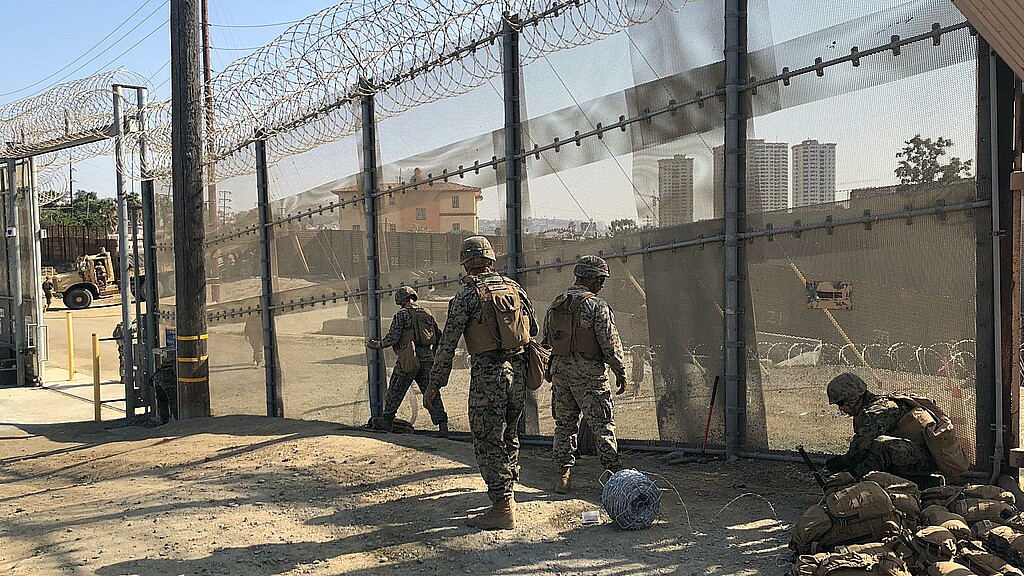Immigration
Congress in talks with Biden to expand border security as part of aid packages to Israel, Ukraine and Taiwan
News of the talks broke just hours after Ukrainian President Volodymyr Zelensky met with the president at the White House for a televised fireside chat with the press corps

December 13, 2023 9:08am
Updated: December 13, 2023 9:08am
The White House on Tuesday told congressional lawmakers it will support a new border authority to expel migrants without asylum screenings and increase detention capacity in the area, according to a report published by CBS News.
The national news network attributed the story to four people familiar who were purportedly familiar with the matter.
The Biden administration reached across the aisle by first breaking the news to members of their own party at the Senate saying it could satisfy Republican requests as part of a $100 billion aid package for the border coupled with military aid to Israel, Taiwan and Ukraine.
The money would be used to hire additional immigration officials and escalate enforcement of border security.
The president’s decision stems from an ongoing dispute with a handful of Congressional Republicans who have been aiming to negotiate a deal that would condition additional aid to Ukraine in exchange for a more concerted effort to hamper illegal border crossings, which have reached record levels.
CBS reported the story just hours after Ukrainian President Volodymyr Zelensky met with the president at the White House for a televised fireside chat with the press corps.
During that Tuesday press conference at the White House, the president said his administration was “working with Senate Democrats and Republicans to try to find a bipartisan compromise, both in terms of changes in policy and [to] provide the resources we need to secure the border." He added that he had “offered compromise already,” and that “holding Ukraine funding hostage in an attempt to force through an extreme Republican partisan agenda on the border is not how it works — we need real solutions.”
The Biden administration also described the meeting as an opportunity to help Ukraine plan its defensive measures against Moscow.
“The leaders discussed Ukraine’s self-defense against Russian aggression, including plans for the coming year,” according to a statement released by the White House.
“President Biden announced a new package of security assistance for Ukraine and reiterated the critical need for immediate Congressional action to ensure we can continue to support Ukraine’s defense. He also stressed the growing cooperation between U.S. and Ukrainian defense industries, enhanced by the successful U.S.-Ukraine Defense Industrial Base Conference last week,” the statement continued.
The White House has recently tried to step up its communication on Capitol Hill. Homeland Security Secretary Alejandro Mayorkas met with senators this week, according to CBS News.
The national news outlet reported that the DHS secretary was hoping to reach a deal before Congress leaves for the holiday season. But one senior DHS official reportedly said Mayorkas and others were offering “technical assistance” to lawmakers and their staff, not offers of negotiation.
For its part however, the White House has said that to move the aid packages forward, it will support new, expansive legal authority that will expel migrants without processing their asylum claims, similar to how the Trump administration utilized the Title 42 COVID-19 pandemic order.
That order allowed immigration officials to temporarily pause on asylum law amid a health emergency. The president’s decision comes amid a massive immigration crisis in which the border has seen the highest number of migrants claiming asylum in decades.
In addition to adjusting asylum procedures, the White House said it would support an expedited removal across the nation, allowing the government to deport migrants without court hearings if they fail during their initial asylum interviews.
The program is currently only being utilized in the southwest border region but would instead be expanded across the United States.
The U.S. would also mandate the incarceration of certain migrants pending adjudication of their applications, although CBP has currently reported they have very limited resources to house migrants along the southwest border.
In the past, the White House has considered amping up the screening standard for credible fear interviews, making it harder for migrants to pass or face expedited removal.
According to a statement released by the White House, the administration has not “determined policy positions” yet in the ongoing congressional negotiations.
“The White House has not signed off on any particular policy proposals or final agreements, and reporting that ascribes determined policy positions to the White House is inaccurate,” said White House spokesperson Angelo Fernández Hernández.
“The President has said he is open to compromise and we look forward to continued conversations with Senate negotiators as we work toward a bipartisan package.”
While the White House may be securing a deal with the Senate, it is unknown whether House Republicans, some of whom have demonstrated an even terser anti-immigration stance, will accept such a package.
In its statement on the meeting with Zelensky, the White House said it was determined to see Kyiv triumphant in its quest to preserve Ukrainian sovereignty from Russian invading forces.
“President Zelenskyy briefed President Biden on Ukraine’s use of the corridor in the Black Sea to export its grain and other products, alleviating global food security concerns and contributing to Ukraine’s tax base. President Biden stressed that Russia will not outlast the collective support for Ukraine by a coalition of over fifty countries brought together by U.S. leadership in defense of a rules-based international order based on a respect for sovereignty and territorial integrity of all states.”









